Are you looking for vagus nerve stimulation + the perfect vagus nerve home ready? I have 11 to share today.
Because mental health is critical to overall health, and it 100% correlates with to gut health, this conversation is important.
In fact, I’ll go as far as to say that vagus nerve stimulation is very important in overall gut health and, when functioning optimally, can make a huge difference for your digestive system.
Most of this talk today falls under the lifestyle pillar of the A Gutsy Girl 3 pillars to ultimate gut healing.
When it comes to irritable bowel syndrome and inflammatory bowel disease we spend so much time trying to figure out the medication and the supplement for making chronic disease disappear.
But if I’ve said it once, I’ll say it 5 million more times: there is so. much. more to the equation than medical interventions alone.
And I believe with my whole heart (because I have lived through it and came out on the other side healed) that if we could focus more time on the lifestyle pillar, far more true healing would happen.
Anyways, when I started talking about these topics via social media (namely Instagram), people were incredibly intrigued.
This is a good sign that perhaps we may be able to spend an equal amount of time on lifestyle changes for gut healing as we do for diet and medications.
Before we dig into any specific vagus nerve home remedy, let’s discuss what (and where) the vagus nerve is.
Autonomic Nervous System
The autonomic nervous system is a component of the peripheral nervous system that regulates involuntary physiologic processes including heart rate, blood pressure, respiration, digestion, and sexual arousal. It contains three anatomically distinct divisions: sympathetic, parasympathetic, and enteric. (source)
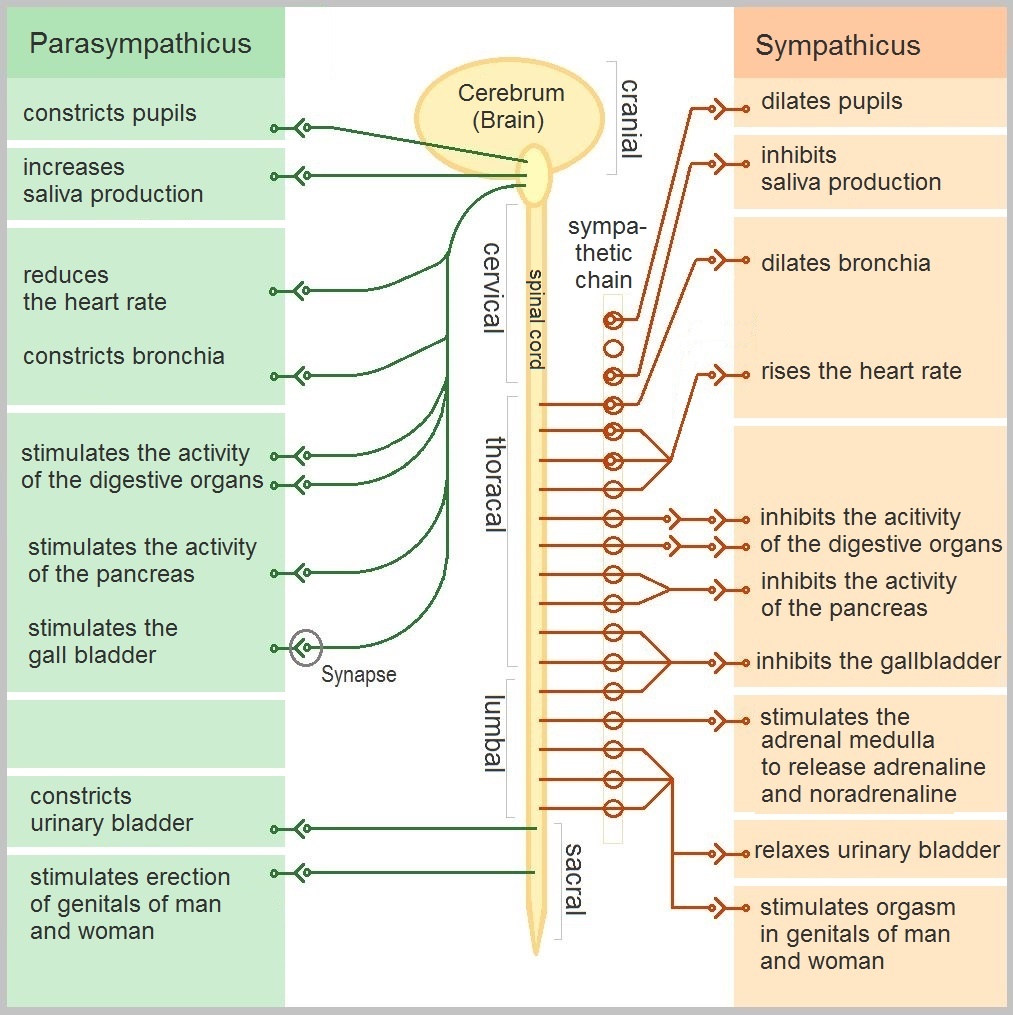
(image via Wikimedia Commons HERE)
I have discussed the enteric system in more detail via these two posts:
Typically, as shown in the image above, it’s the parasympathetic and sympathetic nervous systems that are mostly discussed when referring to the autonomic nervous system.
What is the Vagus Nerve?
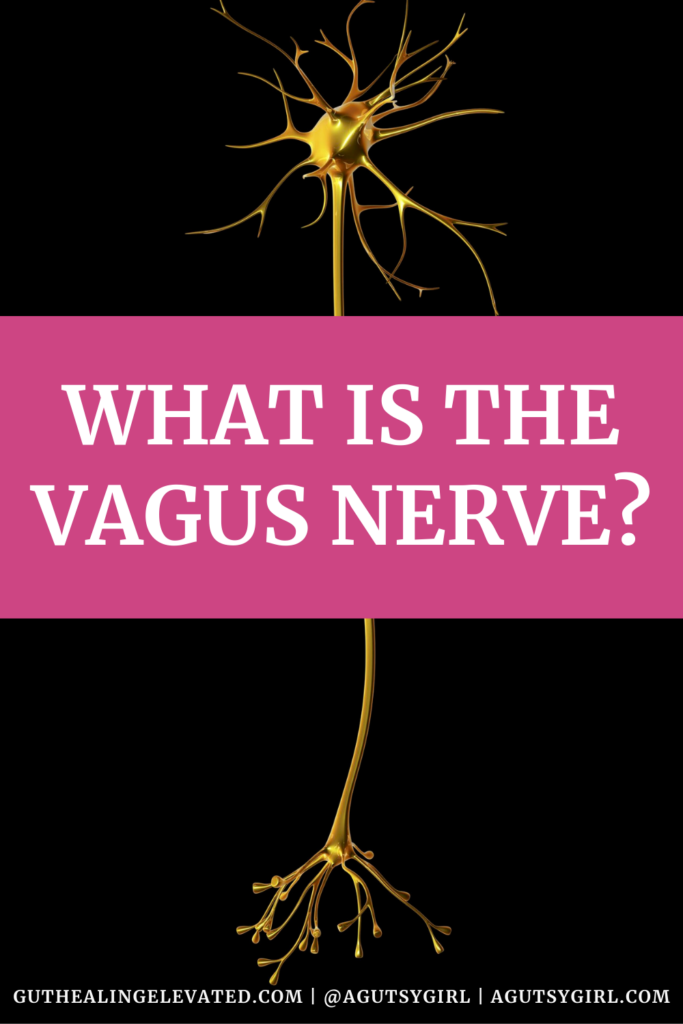
Vaga, in Latin, means “to wander.”
The vagus nerve, the longest nerve of the cranial nerves (there are 12 pairs of cranial nerves total), controls your inner nerve center—the parasympathetic nervous system (the right and left vagus nerve contain 75% of your parasympathetic nervous system’s nerve fibers).
And the parasympathetic nervous system is highly relevant for the Gutsy community,
Sometimes called the rest and digest system, the parasympathetic system conserves energy as it slows the heart rate, increases intestinal and gland activity, and relaxes sphincter muscles in the gastrointestinal tract.
As the controller, then, the Vagus Nerve has an important job.
Besides its role in helping us make memories and breathe, the vagus nerve function is highly involved in preventing inflammation in the human body, initiating the body’s relaxation response, and translating between gut and brain.
In fact, the NIH says about the Vagus Nerve,
It establishes one of the connections between the brain and the gastrointestinal tract and sends information about the state of the inner organs to the brain via afferent fibers.
A vagus nerve disorder can even contribute to high blood pressure. It is also part of the sympathetic nervous system, responsible not only for digestion but for emotional well-being. (source)
If you watch this short video on the Vagus Nerve, you can visually connect the dots, witnessing the important role it plays.
And you’ll see how the Vagus Nerve directly affects:
- breathing
- speech
- swallowing
- heartbeat
- blood pressure
- hearing
- taste
- circulation
- digestive tract
- gut health
- bladder movement
- orgasms
- fertility
Wow! That’s a lot, yes?!
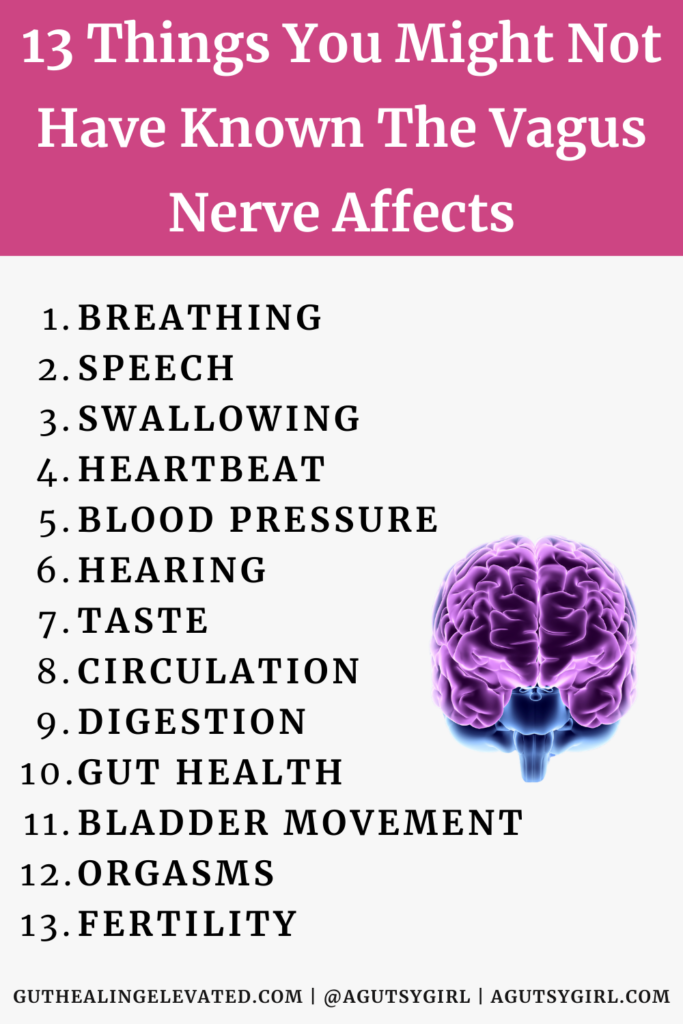
Digestion
Let us, for just a moment, focus on only the vagus nerve and digestion.
Here are 4 more ways the two are connected:
- The vagus nerve tells the stomach to churn the food within it, as well as to produce stomach acid that’s necessary for digesting that food and a number of other things. That’s why a damaged or under-active vagus nerve often results in low stomach acid levels and low enzyme production. In turn, this means digestion is ineffective. (source)
- The Cleveland Clinic reports, ” Vagus nerve damage can lead to gastroparesis, food not moving into your intestines.”
- This research indicates, “A significant, and growing, body of literature supports the actions of gastrointestinal luminal microorganisms to modulate gut-brain signaling via vagal afferents, the so-called microbiota-gut-brain axis. While gut microbiota might normally be expected to activate vagal afferents directly only under conditions where intestinal permeability is compromised (e.g. following inflammation or stress), luminal bacteria may activate vagal afferents indirectly, subsequent to stimulation and release of neuroactive mediators from enteroendocrine cells or gut associated lymphoid tissue (GALT). (source)
- Furthermore, the research study in #3 also states, “The GI tract receives the majority of the vagal efferent nerve fibers and harbors the most immune cells in the body.”
Now that you can see just how important it is, the question becomes, “How can we stimulate the Vagus Nerve?”
A groundbreaking new approach to flipping the switch on stress.
Just Calm
Just Calm: Your Secret Weapon For Switching Off Stress.
Use code AGUTSYGIRL at checkout to save 15% off this breakthrough new stress management and mood support formula
Vagus Nerve Home Remedy {11 Ways for Stimulation}
Click HERE to save this post for later.
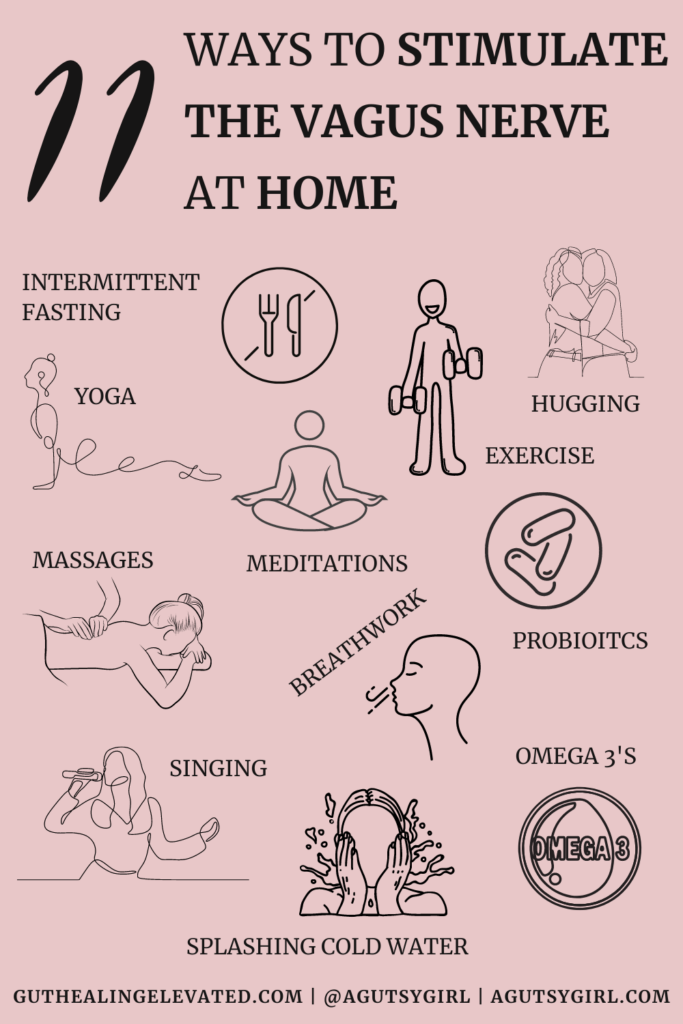
Vagus nerve stimulation (VNS) refers to any technique that stimulates the vagus nerve, including manual or electrical stimulation of the vagus nerve (via electrical impulses).
Vagus nerve stimulation uses electrical impulses to stimulate your left vagus nerve. Healthcare providers implant a small device in your chest, under your skin. A wire runs under your skin connecting the device and nerve.
For the purposes today, I am only discussing manual stimulation; things you can do on your own at home to address chronic pain and the gut-brain axis in order to find more healing for your gut and on your gut-healing journey.
First, here are 8 things that can affect Vagus Nerve stimulation:
- stress
- anxiety
- smoking
- alcohol
- over working
- lack of exercise
- improper nutrition
- lack of sleep
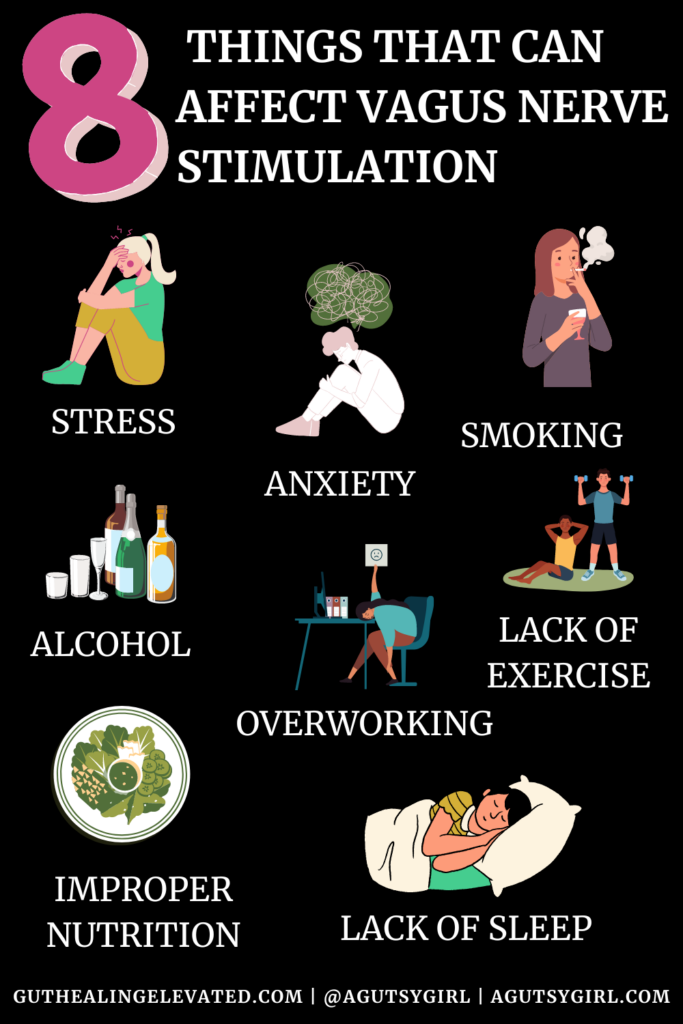
And when it is negatively affected causing vagus nerve dysfunction, here are some issues with your physical health that can transpire:
- depression or depressive symptoms
- anxiety
- obesity
- cardiovascular disorders
- hypertension
- diabetes
- digestive disorders like irritable bowel syndrome
- chronic inflammation and an impaired immune system
- kidney malfunction
- infertility
- Parkinsons
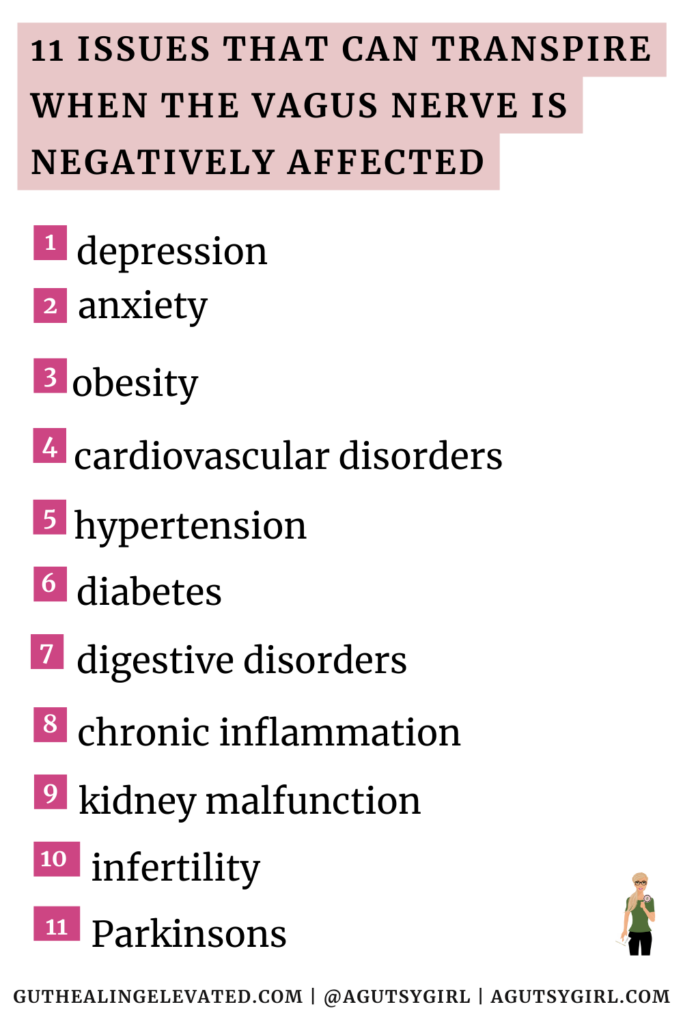
But help is on the way if you’re looking for significant improvement in your central nervous system.
11 Things You Can Do at Home for Vagus Nerve Stimulation
{Check out 32 science-backed ways to stimulate the Vagus Nerve HERE.}
These are 11 home remedies I want to touch on today. You can save all 11 HERE.
1. Breathing Exercises
Deep breathing reduces the stress response and activates the parasympathetic nervous system. In 2012, I taught different ways to go about active breaking exercises.
You’ll find my favorite one HERE.
2. Meditation
The NIH reports, “A sensation of vibration is experienced during audible ‘OM’ chanting. This has the potential for vagus nerve stimulation through its auricular branches and the effects on the brain thereof.” A meditation practice can reduce high blood pressure and helps with emotional regulation by brining us back to the present.
3. Exercise
Movement is good; too much is not. Exercise, both aerobic and floor exercises, are effective ways for an overall increase in vagal nerve stimulation.
In fact, THESE 5 simple stretches for bloating could be just the boost you need today.
4. Yoga
Because yoga combines the art of movement with breathing techniques, there are many positive side effects on the vagus nerve.
5. Omega-3-rich diet
The NIH reports,
Omega-3 fatty acids, such as eicosapentaenoic acid (EPA) and docosahexaenoic acid (DHA), have been shown to provide stimulation to CN X.” I think this one is so important to include because having a diet rich in Omega-3’s is also critically for addressing chronic inflammatory diseases and reducing inflammation. Good food sources include things like: salmon, tuna, eggs, flax, chia, and walnuts.
6. Probiotics and a Probiotic-rich diet.
“Because of the brain-gut connection that is overseen by the vagus nerve, the proper gut function can enhance proper brain and body functions through the vagal pathways.” (source) In fact, if you want to dive deep into this topic, check out ‘What Role Does the Gut Play in Mood and Brain Health {Episode 37 with Tina Anderson}.’
7. Singing and chanting
Even if you only sing in the shower, what happens when you do it? That’s right – your mood instantly improves.
Singing and chanting positive impact the parasympathetic nervous system. Let’s take this a step further; might I recommend some mantra chanting? How do you do that?
Choose a gut healing mantra (I have 31 for you to choose from HERE), and chant it as loud as you can wherever you feel comfortable.
8. Splashing your face with cold water
Or cold therapy in general. Wellness Mama has written about Cryotherapy and details its benefits. But even if you can’t do that, simply exposing your body to cold can help.
One thing I try to do each time I shower is do intermittent cold shower periods. I turn the water to cold and deal with it as long as I can, repeating at least a few times. Cold exposure is healing (and believe me, I don’t enjoy admitting this one because I loathe the Minnesota winter!)
9. Hugging
Huh? Well, the act of hugging releases Oxytocin, which is a powerful hormone with anti-stress and anti-inflammatory effects. (source)
10. Massages
This one seems like a “luxury,” and it is, but it was also a huge piece to my healing. Massaging in certain areas also helps increase a healthy vagal tone.
It can bring blood flow to the places most needed, and I always mention massage as part of my constipation hacks.
In fact, try THIS lacrosse ball hack for bloating and see how it help all around.
11. Intermittent Fasting
While I do not believe IF (intermittent fasting) is for everyone, I do believe that some form of intermittent fasting is highly beneficial for many in this community.
Learn more about my experience with it HERE.
Learn More about the Vagus Nerve
If you’re like me, you never want to stop learning about topics that truly help the trajectory of your gut healing (or lack thereof).
So, I have put together some more resources for you to check out.
Books
If you’re interested in learning more about what the vagus nerve is and how to heal it, check out Accessing the Healing Power of the Vagus Nerve: Self-Help Exercises for Anxiety, Depression, Trauma, and Autism by Stanley Rosenberg.
Here is the Amazon description of this book,
This practical guide to understanding the cranial nerves as the key to our psychological and physical well-being builds on Stephen Porges’s Polyvagal Theory—one of the most important recent developments in human neurobiology. Drawing on more than thirty years of experience as a craniosacral therapist and Rolfer, Stanley Rosenberg explores the crucial role that the vagus nerve plays in determining our psychological and emotional states and explains that a myriad of common psychological and physical symptoms—from anxiety and depression to migraines and back pain—indicates a lack of proper functioning in the vagus nerve.
Another popular book on the topic is The Polyvagal Theory in Therapy: Engaging the Rhythm of Regulation by Deb Dana.
Additional Healing Methods
You’ll find these + more in detail HERE:
- Gag reflex (as an exercise)
- Tai Chi
- Humming
- Hymn singing
- Zinc
- Form great social connections and embrace good personal relationships
- Continuously embrace positive emotions
Podcast Episodes
- Anxiety and Your Gut (Episode 36 with Alison Seponara). In addition, Alison wrote this book (I have it!) that’s super helpful, The Anxiety Healer’s Guide: Coping Strategies and Mindfulness Techniques to Calm the Mind and Body.
- Why Stress May be Your Worst Enemy {Episode 39, Short #1}
- Can Stress Cause Diarrhea (Episode 28 with Isabel Smith)
- Stressful {Episode 18 with Dr. Marcus Cirelli}
- Acid Reflux vs Gastritis {Episode 42 with Jade Etter}
That Gut Feeling
I hope you have learned a ton today! If you are having that gut feeling that you have not been fully addressing the vagus nerve and consequently have low vagal tone, consider taking action.
Because this post is filled with actionable steps and ideas for getting started today, you have the power to do it!
If you enjoy this hands-on approach to getting started today and learning all about the power of gut healing, you’ll love Gut Healing: ELEVATED.
In this course you’ll:
- Find freedom from constant worry about what’s going on.…. without going down another Dr. Google rabbit hole.
- Understand the exact steps to take, in what order to take them.…..without spending thousands more.
- Eat!….…..without arbitrarily cutting out entire food groups.
- Learn from me – everything I did and tried along the way.
And if you want to get started on your journey today, simply use code WEBINAR at checkout to save 25% off the course for a limited time only.
What else would you like to know and/or have me dive deeper into as it relates to the Vagus Nerve?
If you liked this post, you might also enjoy:
- Is Stress Causing My Digestive Distress (learn more about the enteric nervous system and its correlation to stress + the vagus nerve)
- The Importance of Shifting from Stress to Happiness
- Best Teas for Stress and Depression {11 Teas to Boost Mood}
Xox,
SKH
🤰 bloating be gone! weight loss through optimal gut health for women
💃ʜᴇᴀʟ ʏᴏᴜʀ ɢᴜᴛ. ʜᴇᴀʟ ʏᴏᴜʀ ʟɪfe.
🫶🏻 founder gutbyome.com

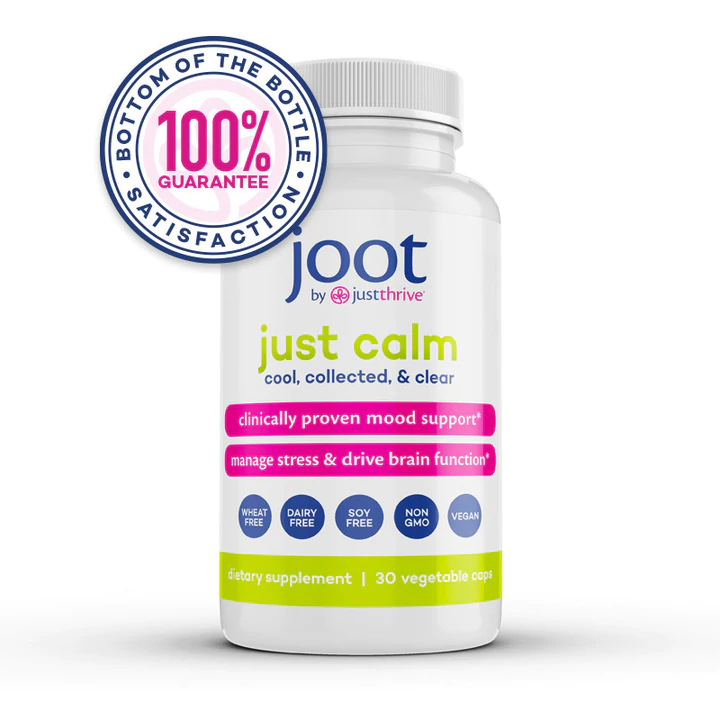
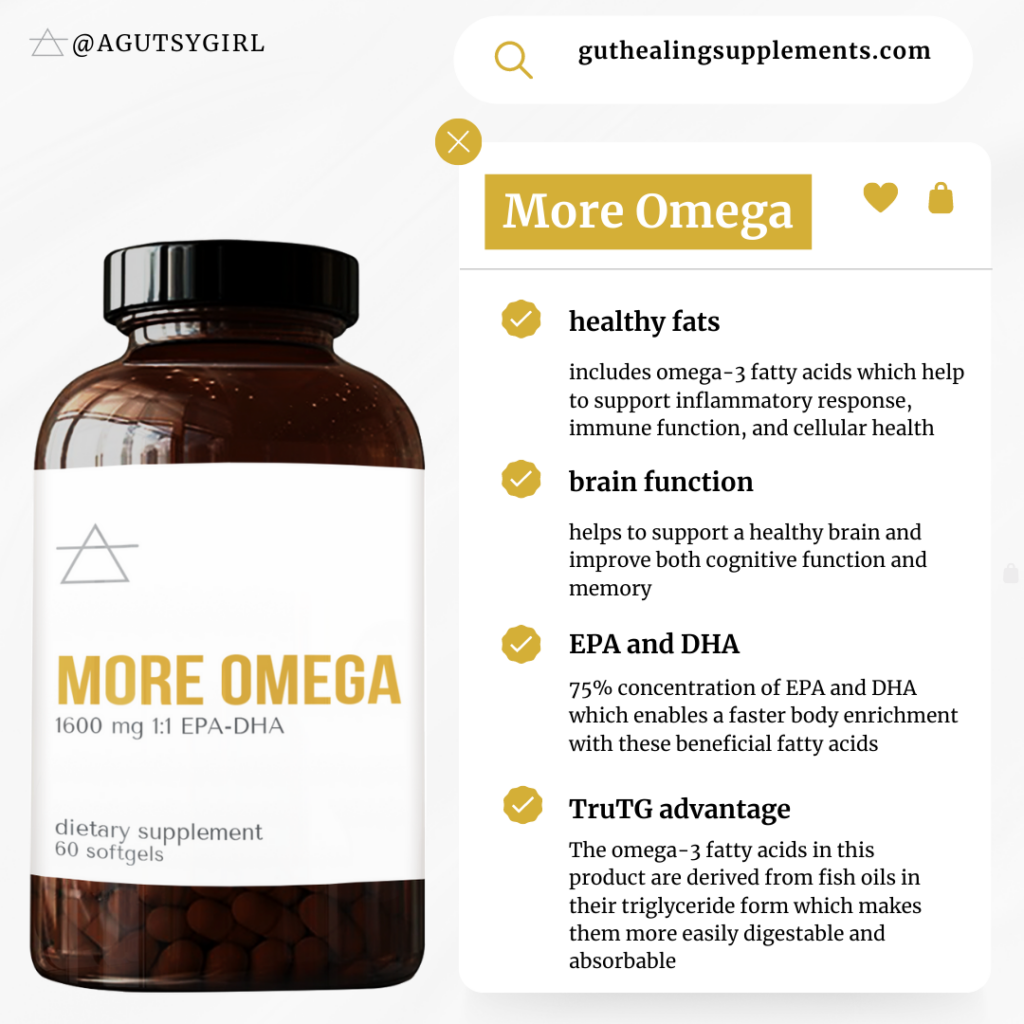
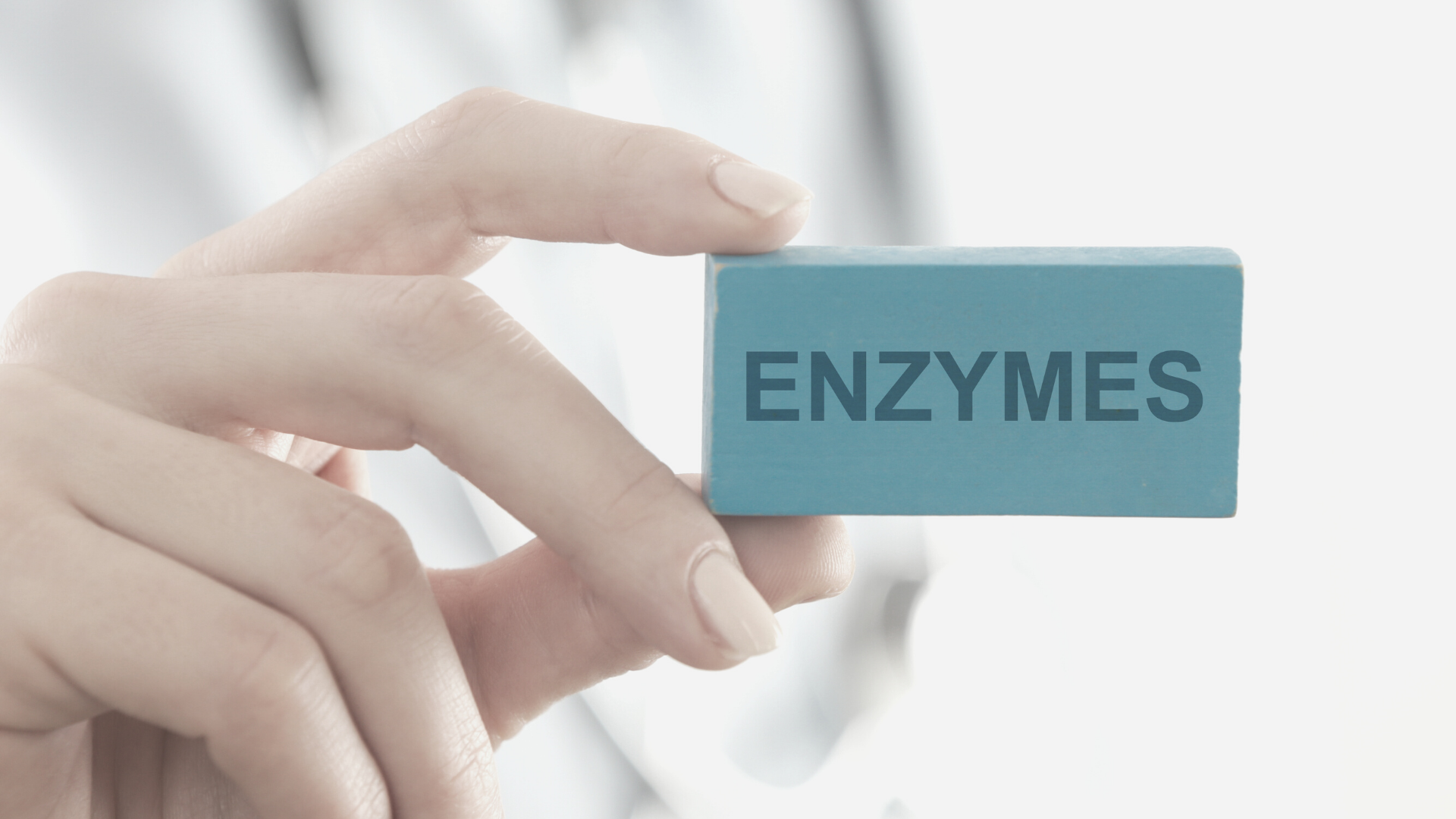
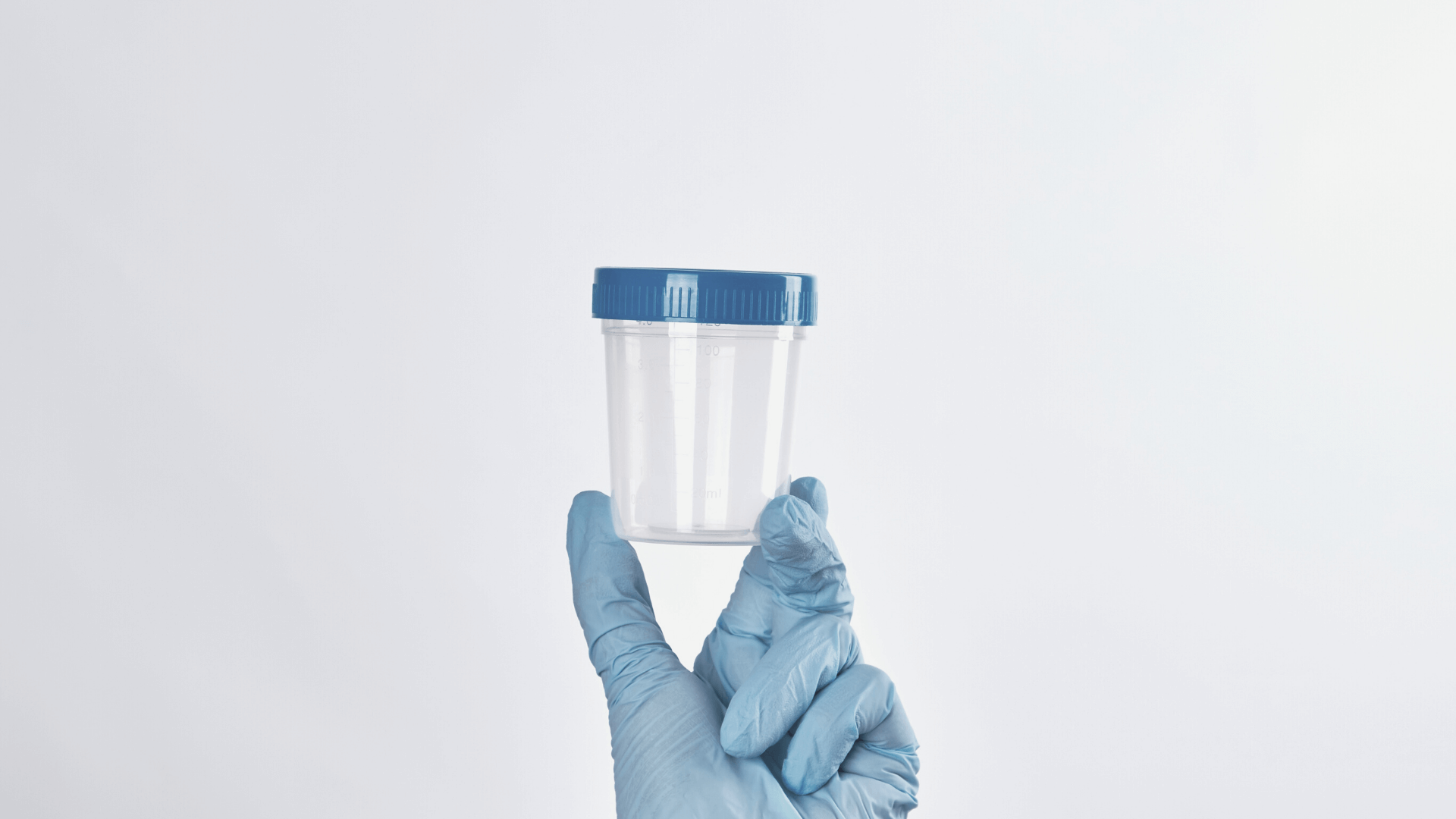
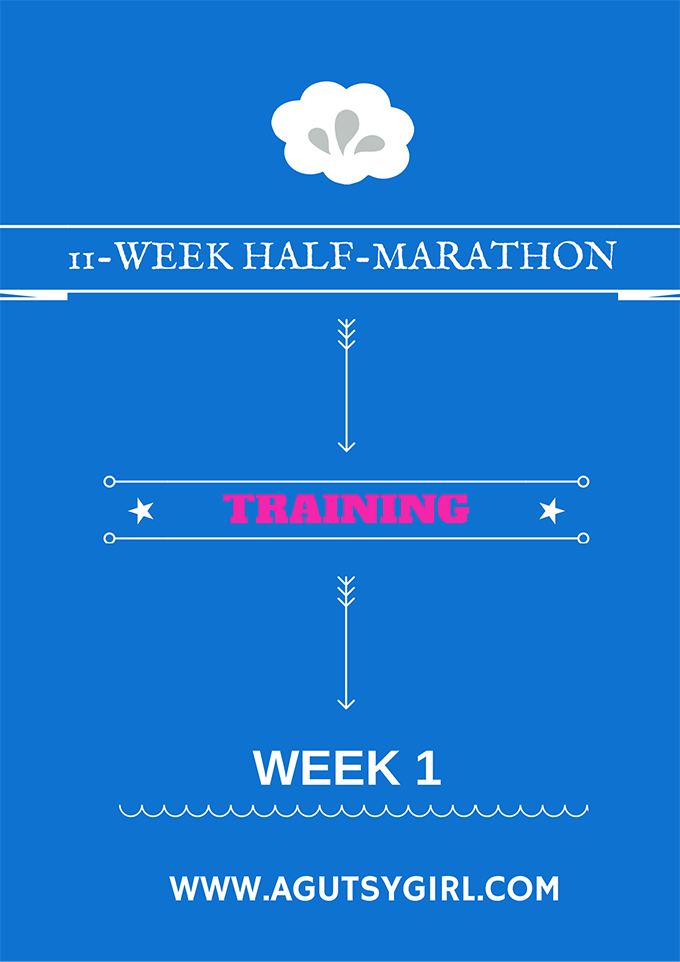

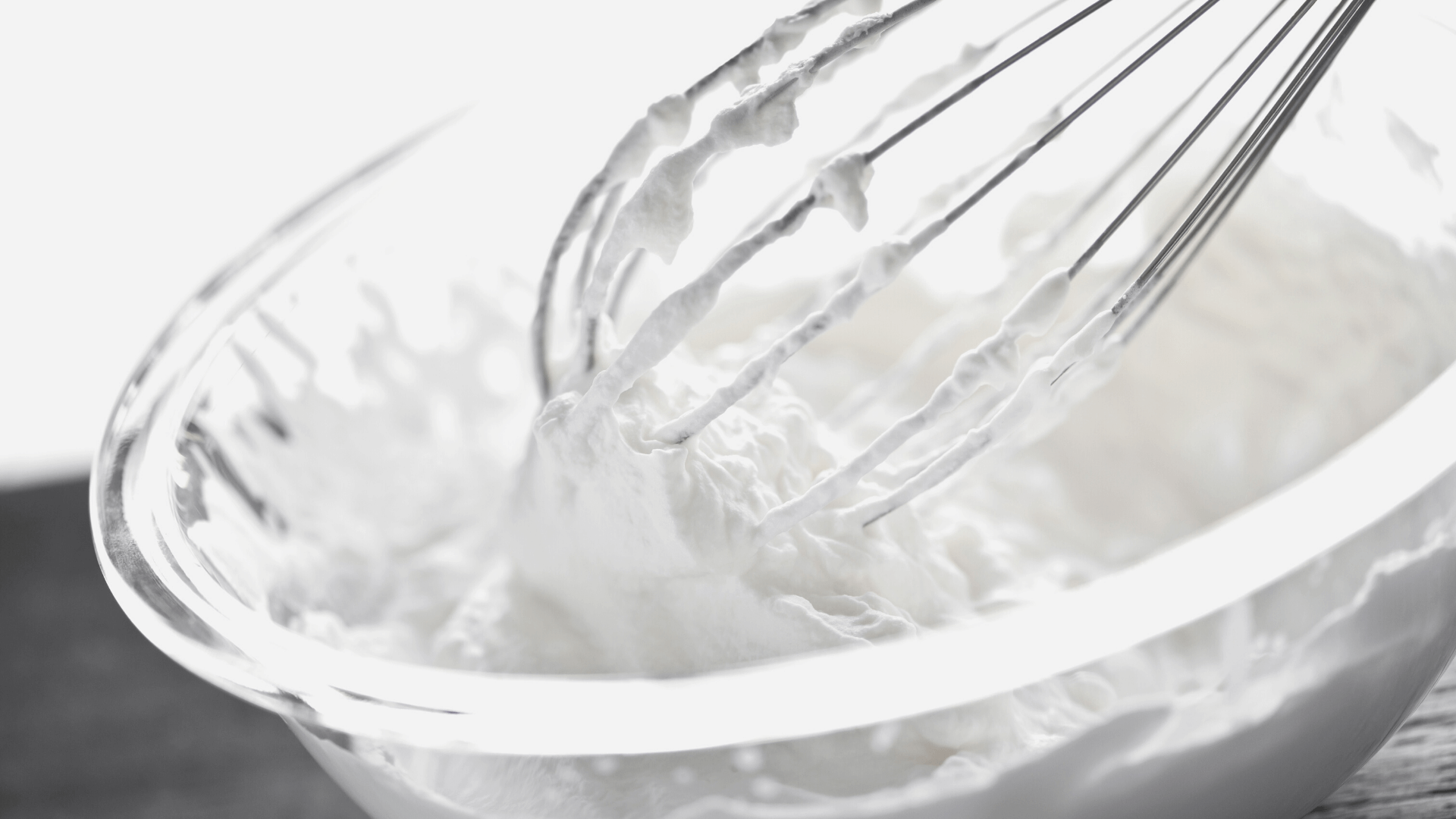
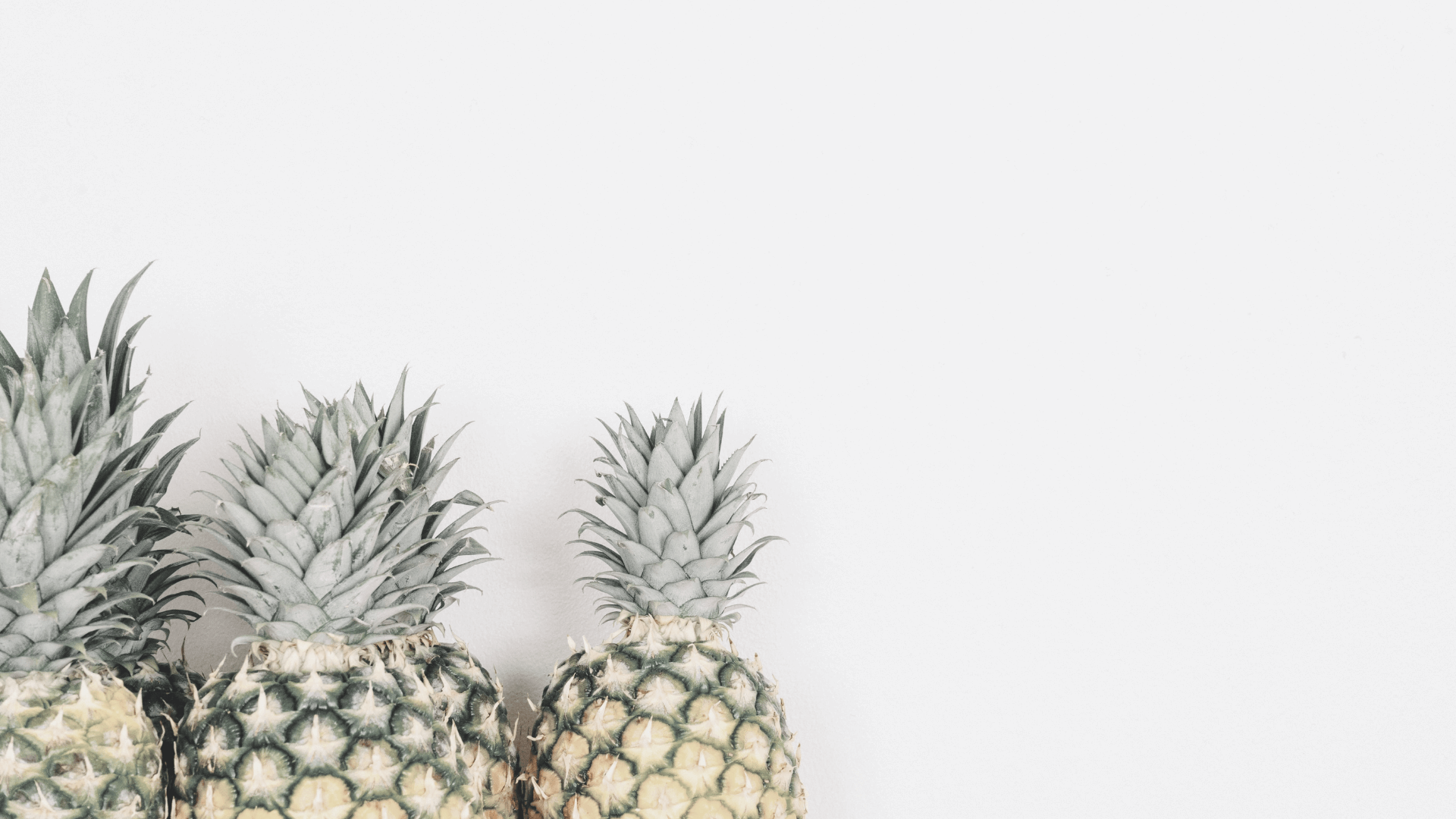
This article is just what I needed this morning. Last week was diagnosed with Gerds and Gastritis. I’ve been trying to follow a Gerds diet for several weeks. Last weekend I purchased a juicer. After only 2 glasses of juice, I think I’m returning it. I feel there is way to much waste, so much clean-up. I want to learn how to eat responsibly. I cant wait to dig into this article!
Juicing is the ONLY thing that helps my sister, but even smoothies don’t. Juicing is so exhausting for her to do it, but if she’s consistent, she does begin to feel better and gain energy. I only share to encourage you to try it a while longer despite the “waste.”
Hi there, just wondering if anyone out there can please tell us HOW LONG to sing, hum, chant etc. in order to actually stimulate the v. nerve?? Is it 10 seconds? Is it two songs worth? I have researched this and only ever get a ‘list’ of things to do, but no real instructions. Would love to know, for example, if simply humming for one min is enough. Do you know if there is any research that gives specifics?
Thanks so much ~